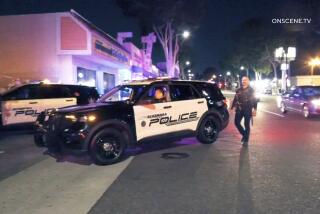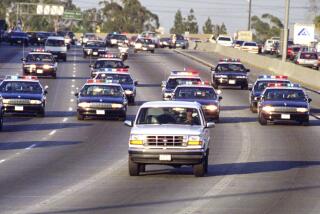Chopper Exclusive! Live! CHP Traffic Stop!
- Share via
This past July 30, authorities allege, Gregory Michael Cabral attempted to purchase a spear gun from a dive shop in Newport Beach with a bad check. When the clerk refused to honor the bad check, Cabral reportedly claimed he was with the CIA and was taking the spear gun, worth about $100, as evidence. While driving away, Cabral allegedly attempted to run over a police officer and then led police on a two-hour freeway chase until his pickup truck gave up the ghost and he was forced to surrender. He had been wounded in the confrontation with the police officer and is being held in a jail ward in Santa Ana. Bail was set at $25,000.
KNBC-TV, which is owned by NBC, where I have worked for 30 years, decided to blow out most of a newscast to cover and broadcast this car chase live. What happened at City Hall, Parker Center, the latest on the Dodgers and the weather went out the window. Stories that had been prepared for the 4 p.m., 5 p.m. and 6 p.m. newscasts were spiked in favor of live pictures of a driver hopelessly attempting to elude the authorities. The alleged perpetrator of this crime was not exactly Jack the Ripper. Members of his family said Cabral had a long history of mental illness.
Bill Lord (no relation), former news director at KNBC-TV, told me the pressure to cover these kinds of nonstories is immense because TV audiences in Los Angeles crave them. When KCAL ran a car chase in prime time, from 9 p.m. to 11 p.m., about a year and a half ago, they received a 15 rating and a 30 share, more than five times their normal audience. Other general managers and news directors went to school on that experience.
“If we don’t cover a car chase,” said Lord, who has returned to his hometown of Seattle to run the news operation at the CBS affiliate, “somebody else will, and you’ll wind up with lower ratings.”
It would be unfair of me to single out KNBC; all stations with access to helicopters do the same thing. I admire much of what KNBC puts on the air, but the reality of today’s TV marketplace places news professionals in an awkward position. Cover the car chase and prosper. Cover the news and get your resume in the mail.
I also have tremendous admiration for the brave and talented people who work in news helicopters. KNBC’s Bob Pettee, who flew and reported on the July 30 chase, is one of the most skillful and professional pilot/journalists in the business.
The benefits provided by aerial coverage of real breaking news stories are well established. Videos of the Los Angeles riots, the Northridge earthquake, the North Hollywood bank shootout and car wrecks, brush fires or traffic reports during drive time speak for themselves. The aerial platform is unique in its perspective and the speed with which it delivers the information and the pictures the public needs and wants.
The job is somewhat glamorous and very dangerous. Francis Gary Powers crashed the KNBC helicopter in 1977 when, in pursuit of a story, he allowed the bird to run out of fuel, killing himself and his cameraman. One of my proteges, cameraman-producer Tom Cummings, who had just covered a tornado for ABC’s Dallas affiliate, was killed when his helicopter hit some power lines as they were trying to rush his video back to the station in time for the 10 p.m. show.
The problem here is not with the helicopters or the people who fly them--the paparazzi of the air. The problem is not with aggressive people risking a lot to cover a story, but rather with those pushing them in the quest for the Almighty Buck.
“We put on car chases because the viewers love them,” said KNBC-TV Vice President and News Director Nancy Bauer Gonzales. “When we cover a car chase, we’re covering the unknown. We’re not sure what’s going to happen. That’s part of what makes it exciting. As for blowing out the rest of the newscast, we measure the chase against what else is going on that day and make an instant decision. We would not, for example, interrupt coverage of Princess Di’s funeral for a car chase.”
Car chases, for the most part, are not news. They are television. Live as it happens, but of little significance to our community. On July 31, the day after Cabral was captured, KNBC did not offer one follow-up story about him. He wasn’t news any more. He wasn’t even television.
More to Read
The complete guide to home viewing
Get Screen Gab for everything about the TV shows and streaming movies everyone’s talking about.
You may occasionally receive promotional content from the Los Angeles Times.






